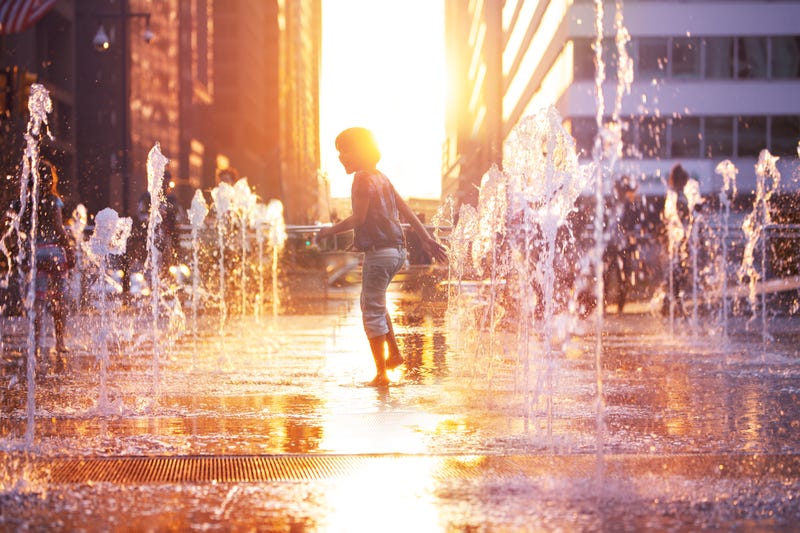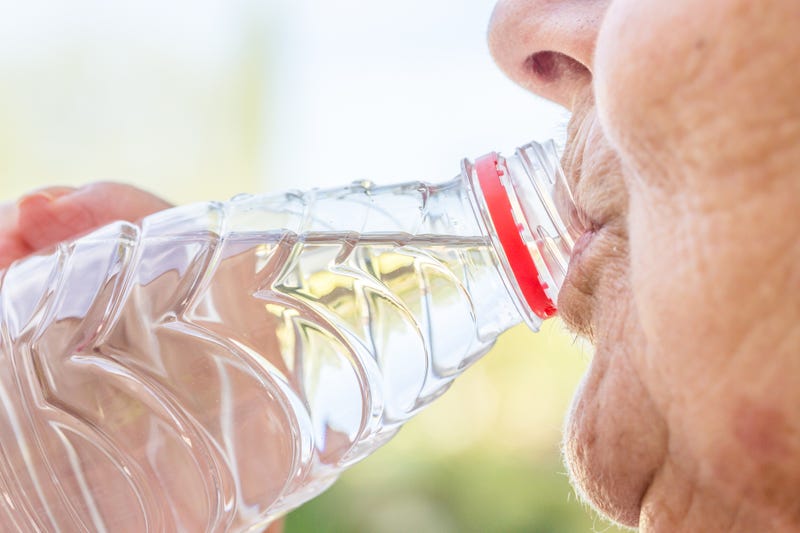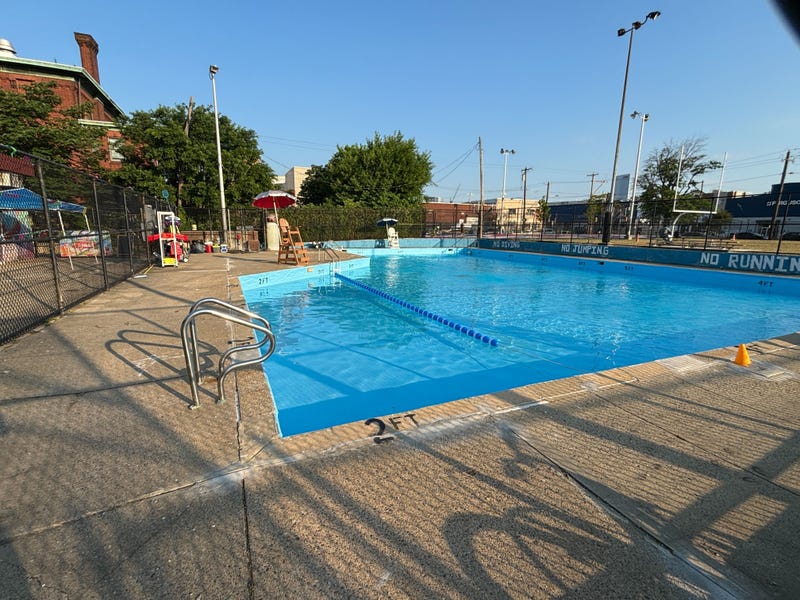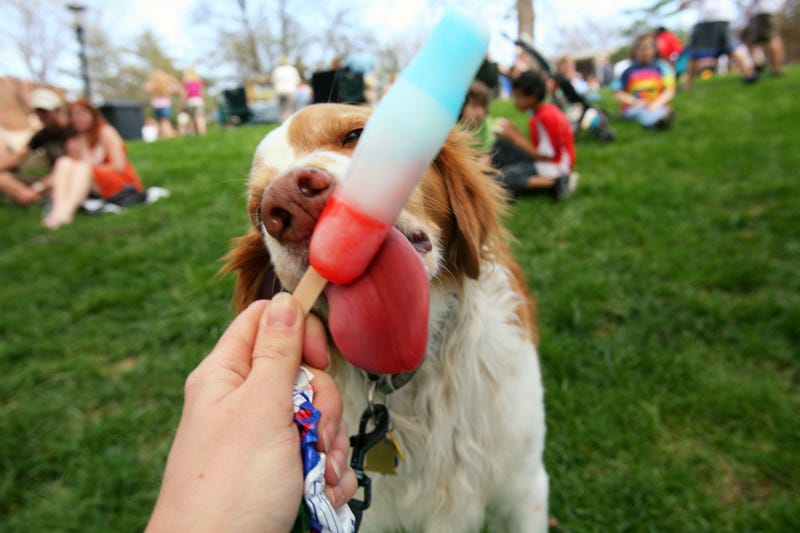
PHILADELPHIA (KYW Newsradio) — Sizzling conditions are in the forecast, and a heat advisory is in effect in the Philadelphia region. When high temperatures hit the 90s, it is important to keep yourself and your loved ones safe. Everyone is at risk for dehydration, heat exhaustion and heatstroke during extended periods of high temperatures and high humidity.
Out on Kelly Drive on Tuesday morning, near the Philadelphia Museum of Art, conditions were a little muggier and temperatures were about 10 degrees higher than at the same time Monday.
Experts say it won't get better for another week or so. The heat index could reach as high as 96 degrees Tuesday and Wednesday, according to the National Weather Service. After that, meteorologists expect temperatures to really crank up.
When temperatures reach their heights, it can be uncomfortable to be outside for long, but some have no choice — like Joe, a construction worker in Center City.
"You know what, it's something you get used to after doing it for so long. A lot of water. Yeah, take a couple breaks, and hydrating."

During very hot weather, Philadelphia will announce a heat health emergency on phila.gov, and through the city’s free mass text alert system. (Sign up for those texts on the city's website.) Mobile heat health teams may be dispatched. Residential utility shut-offs are stopped. And certain services are activated to help residents stay safe.
Here is a quick guide to heat emergency resources in the city.
What you can do
Public health officials cannot stress that enough: Increase the amount of water you drink. When it gets this bad out, limit caffeine and alcohol intake. Wear lightweight, light-colored, loose-fitting clothes, and take cool, not hot, showers and baths.
Health officials recommend regularly checking in on friends, neighbors and relatives who may be vulnerable — young children, older people, and people with diabetes, heart and respiratory issues such as asthma, bronchitis and emphysema. These vulnerable populations are advised to limit their time and activity outdoors on hot days.
For people who do not have access to air conditioning at home, electric fans can provide some relief, but keep a couple of windows open. Running fans with the windows closed can cause convection, which actually increase the indoor heat.
Seniors in Delaware County who are particularly at-risk during heat waves can pick up a free fan at all COSA-funded senior centers, as well as at their Baldwin Tower office in Eddystone.
And residents over the age of 60 in Camden County who make $25,000 a year or less can call their Senior Services Center at 856-858-3220 for a free box fan.
And under no circumstances should children or pets be left unattended in vehicles. Car interiors can reach unsafe temperatures in as little as two minutes.
Save these phone numbers
Heatline: 215-765-9040
The Philadelphia Corporation for Aging will open this special helpline number for callers seeking heat-related health and safety tips and help with non-emergency health issues.
Homeless outreach: 215-232-1984
Philadelphia's Office of Homeless Services has declared a Code Red Alert, effective Tuesday, 7 a.m., until further notice. City officials urge anyone who sees a homeless person, or someone in need of shelter, to call this homeless outreach number.
911
If you think someone is having a medical emergency, call 911.
Cooling centers
In a heat health emergency, the city coordinates with various air-conditioned locations to give access to city residents so they can escape the heat. Cooling centers can include, libraries, schools, buses, and other locations.
Find your nearest cooling center online.
Other tips include using public air-conditioned spaces, like the museums on the Benjamin Franklin Parkway.
Public pools and spraygrounds
There is a public pool or sprayground in every ZIP code in the city. All 60 outdoor public pools are expected to open this summer. Call individual pools for hours. About 70% of the open pools are in low-income communities, where the average family income is $45,000 a year or less.
Despite a lifeguard shortage, all pools will offer free swim lessons for children.
The following pools are open as of Tuesday, June 18:
—Chew Pool – 1800 Washington Ave.
—Christy Pool – 728 S. 55th St.
—Fishtown Pool – 1202-32 E. Montgomery Ave.
—Hunting Park Pool – 900 Hunting Park Ave.
—Kelly Pool – 4231 Lansdowne Dr.
—Mitchell Pool – 3700 Whitehall Lane
—Penrose Pool – 1101 W. Susquehanna Ave.
—Scanlon Pool – 1099 E. Tioga St.
More pools will open throughout the week, at a rate of three or four a day, at other locations throughout the city. See the 2024 opening schedule.
More than 90 spraygrounds are open from 11 a.m. to 7 p.m. every weekday until Labor Day, except in the case of inclement weather.

Locate the nearest pool and the nearest sprayground with the Philadelphia Parks and Recreation Finder.
Philadelphia’s fountains like the ones at LOVE Park, Dilworth Park and Logan Square in Center City can also provide relief.
The city asks people not to open fire hydrants, however, as doing so can diminish water levels for homes and businesses and make it harder for firefighters to do their work in extreme heat.
And though you may be sorely tempted by adventure, swimming in Philadelphia’s rivers, streams and other natural waterways is dangerous and not allowed.
Keeping pets safe
These tips can help families keep their pets out of the emergency veterinarian's office.

1. Bring pets indoors out of the sun and into air-conditioned spaces. Those without air conditioning should keep fans running to circulate air.
2. Make sure pets have water at all times. Go a step further and put some ice cubes in the water bowl.
3. When running errands, leave pets at home indoors, or in a cool, shaded, safe place outdoors.
According to the Philadelphia Animal Care and Control Team, the city requires all dog owners to have a shaded space large enough to protect the animal from the sun at all times, or their dogs could be put in grave danger.
Dog owners who don’t follow this law can be fined up to $500. Call 267-385-3800 if you see dogs left outside in hot weather.
Limit outdoor time
PSPCA Director of Shelter and Care Facilities Autumn Hipszer recommends only bringing your pets outside in the early morning and after sunset. And, if they do have to go out during peak sunlight hours, keep it quick.
She says too much activity in the heat puts them at risk of heat stroke and other heat-related illnesses, just like it does for humans.
“People think their dogs are gonna tell us when they’re done playing and that they’re tired, but that’s not the case. A lot of times they’ll keep playing and they’re overwhelming their body,” Hipszer said.
